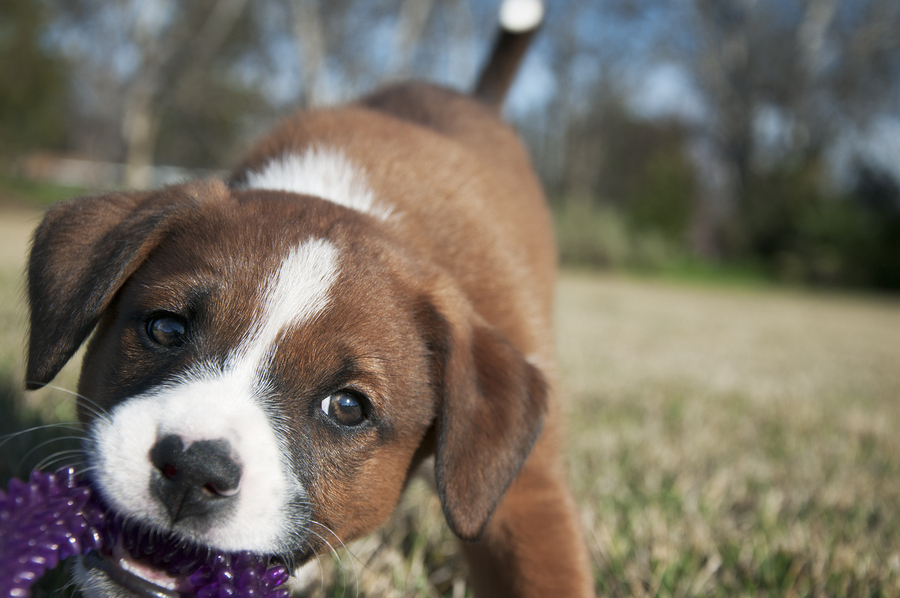Choosing a puppy is a momentous decision. Here’s what to consider.
My friend Andrew wants a huge dog, a Newfoundland or perhaps a Mastiff. His wife, Jane, wants a dog she can pick up and cuddle, one who will be easy to walk and undemanding. For some people, there are German Shepherds or Border Collies, and then all those other dogs. There’s only one breed for them. Other people may just want to add a nice dog, a good dog, to their family. Some will choose a purebred dog because they love the look and want to know pretty much what the size and temperament of the adult dog will be. Others will choose a darling puppy from a shelter or rescue group. Whatever you decide, the following suggestions will help you pick the best puppy for you.
The heart wants what the heart wants. But for a human/canine relationship to work best, you need the right dog for you, and, if applicable, one who is also right for your spouse or partner. I always felt that if you are one of those people who adore one breed and always have, that’s what you should get. Nothing else will do it for you. Or if you need a dog for a specific task, such as herding sheep, hunting, search and rescue, or locating truffles, then you will want a dog with a proven track record in that area. Life is hard enough. Why not make things easier when you need or want a dog?
What about the rest of us? Let’s say there are lots of breeds we like, and we like mixed breeds as well. Let’s say we’re not going to be going duck hunting any time soon and we don’t have sheep that need to be brought down from the hill. Let’s say we just want a dog who will love us to pieces and not give us too hard a time. Then the first issue might be size. Size is pretty easy to predict with a purebred dog. Just read the breed standard. Determining size is less easy but not impossible with a mix. So if you don’t want to be flying down the street airborne, think about size and be realistic. Add 14 or so years to your age and ask yourself what you think you’ll be able to tote around at that age.
As important as size is the energy level of your prospective dog. Purebred or mixed breed, this is not that hard to predict. It can be sussed out by observation. Does the pup or dog you’re considering walk or run going from one place to another? Is he go go go or stop and go? Are you an athlete, a couch potato, or in between? Can you mellow him out with a 15-minute walk or will you need an hour? If you are planning on a purebred puppy, do your research. If you are planning to adopt, make good observations first. The variety among dogs is incredible so there’s a right dog for every need. Keep in mind that good training has the potential to turn a not-obvious choice into the perfect dog.
Even if you have a task that requires a certain kind of dog, one with a good track record in performing that task, you still need the right puppy, one with a good attitude, one you relate especially well to, one you will be able to manage safely. Here are some things to check out to help you make the best decision:
- How does the puppy react to a new environment? Choose a puppy who adapts to change quickly, not one who hides and acts fearful.
- Will the puppy come when called? Be adorable, be appealing, get down low where the puppy is. A puppy who comes when called is people-centered and should learn well. However, if there’s a litter and you are getting mobbed, the puppy who gets to you first and is all over you is probably the strongest minded one in the litter and will not be the easiest to train or live with. Better to take a middle of the litter dog, not the boldest and not the shyest. Friendly but not over the top is what you are after.
- Does the puppy love affection? A puppy who loves physical contact often makes the most satisfying companion.
- Will the puppy follow you? The puppy who follows you as you walk around, like the puppy who eagerly comes when called, is people-centered and might be easier to train. This is a very good thing.
Getting a puppy is one of the most fun things in the world to do. Choosing the right puppy will make both of your lives smoother and easier — and here’s to that!
This article was reviewed/edited by board-certified veterinary behaviorist Dr. Kenneth Martin and/or veterinary technician specialist in behavior Debbie Martin, LVT.








